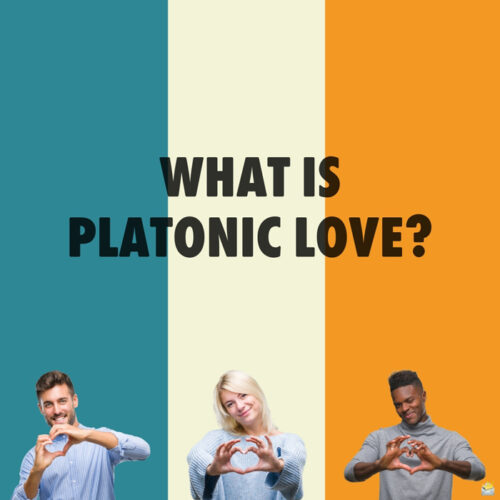What is Platonic Love and How Far is Romance From it?
Sometimes two healthy, sexually-active adults can be close friends with each other without there being any sex involved.
Although many people believe such unions are impossible, they do exist and in fact provide sound experience that can benefit partakers when they do get into sexually-intimate relationships.

Table of Contents
What is Platonic Love?
The original concept of platonic love is not as it is interpreted today. The whole idea was created by the ancient Greek philosopher Plato, and it was used to describe the love a person has for “the divine” side of life. In other words, a person who wants to become godlike through the pursuit and achievement of spiritual goals was said to be motivated by platonic love.
As time went on, platonic love became the term associated with the concept of a strong yet non-sexual cross-sex friendship. However the “divine” element was still involved, as this attraction was said to still be based on the pursuit of virtue though through association with the particular friend involved. In other words platonic love meant a person was attracted to another based on what they perceived as the other person’s higher level of spirituality.
In the modern world, platonic love is generally defined as a strong relationship between two members of the opposite sex who are within compatible and indeed expected-mating ages. But despite what would normally appear as an intimate relationship, the two parties are not engaged in sexual activity or any actions that would indicate an actual romantic relationship.
That said, this does not mean the concept of sexual intimacy is totally absent in platonic relationships. For instance, participants may jokingly flirt with each other.
Platonic Love vs. Romantic Love
Platonic love differs from romantic love in that in a romance there is some level of actual or outrightly intended sexual intimacy.
Thus the manifestation of a platonic love is different from that of a romantic one. For instance, since there is no intimacy involved, participants are more cognizant to respect each other’s personal space. Moreover, since there is little prospect of a lasting intimate relationship ever developing, participants are less inclined to impose their personal wills onto the other person. Along the same vein this lack of high-level personal attachment also allows participants to be themselves more, as in they aren’t afraid to display their true mannerisms and beliefs since there is less fear of the other person abandoning them. In other words, the main reasons a person may feel more comfortable around their platonic as opposed to romantic love, even though logic would dictate the reverse be true, is that platonic relationships have fewer expectations and rules involved, which in turn means participants may make feel freer. And this freedom of course can translate to an increased sense of happiness or fun.
Ultimately the best way to ascertain the difference between a platonic and romantic love may be by studying the goals of the participants. Put differently, if even one member has the active aspiration to sleep with the other, than it is safe to say that his or her strong affection may be based in romance than standard friendship.
When one person in a platonic relationship starts to develop sexual feelings, this can threaten the nature of the relationship and indeed put the entire association at risk. If one of the participants in a platonic relationship is feeling with discontent with his or her romantic love, this could encourage them to view their non-intimate, platonic friend in a potentially romantic capacity.
Some argue that during the course of a platonic love, it is inevitable that at least one of the participants develops intimate, sexually-based feelings for the other. It is the pervasiveness of this belief which explains why many people have a hard time accepting the idea of a purely non-sexual cross-sex love.
Platonic loves can also be used as foundations of romantic ones. In other words, the communication skills and practical knowledge one attains by having a platonic love can assist them in dealing with the opposite sex when they actually do embark on a romance, even if it is not with the same person.
Platonic Love vs. Friendship
Platonic love definitely has a strong element of friendship. For example, people involved in a platonic relationship are often described as “just friends”. However, one of the primary differences is that in platonic love there is a general perception of their being an intimate relationship whereas such may not exist in a friendship. In other words, two people, even of the opposite sex, can be friends without it being platonic love if for instance, they are co-workers who associate due to circumstance or friends from early childhood who people would not generally view as potential lovers.
There is a thin line between the perception of a platonic love and of a general cross-sex friendship. However, since in the former, the word “love” is involved, it can be gleaned that a platonic love is more intimate than a normal friendship, even if no sex is involved. Simply put, having a platonic love is more than the usual friend. It’s like having a bestie of the opposite sex. Under such circumstances and given popular ideologies on courtship, those lucky enough to experience a platonic love will also have to deal with the distractions of societal pressures that dictate the two of them should be sexually involved.
A strong friendship between two family members of childbearing age belonging to the opposite sex, specifically when they are not siblings, may be defined as a platonic love. However, generally they are not called so. The primary reason is that in such associations, just the idea of the potential to get sexually involved doesn’t exist, as there are generally taboos against such practices between blood-related family members who may naturally share close ties.
Even if participants in a platonic love decide to take it to the next level and actually have sexual intercourse, they often choose not to engage in an all-out, ongoing romantic relationship. The reason for this is that they value the friendship element of the relationship so much that they do not want to jeopardize it by engaging in a potentially fleeting romance.
Famous Quotes about Platonic Love
Below is a compilation of some famous quotations about platonic love:
- Even before I met you I was far from indifferent to you. Oscar Wilde
- He reached out and took her hand. Neither cared that someone might see. They had been taught all their lives that the only deep feelings between men and women were sexual, but now they knew that it was a lie. They were friends and they loved one another, and their hand-holding was perfectly innocent. It was one more thing to rejoice in, one more way in which they had risen above the system, above the machine. William Sleator
- Platonic or Divine Love: The boy is so handsome! God has created him so beautifully! Vulgar or Earthly Love: The girl is so hot! I wish I could kiss her! Md. Ziaul Haque
- [A]s people are beginning to see that the sexes form in a certain sense a continuous group, so they are beginning to see that Love and Friendship which have been so often set apart from each other as things distinct are in reality closely related and shade imperceptibly into each other. Women are beginning to demand that Marriage shall mean Friendship as well as Passion; that a comrade-like Equality shall be included in the word Love; and it is recognised that from the one extreme of a ‘Platonic’ friendship (generally between persons of the same sex) up to the other extreme of passionate love (generally between persons of opposite sex) no hard and fast line can at any point be drawn effectively separating the different kinds of attachment. We know, in fact, of Friendships so romantic in sentiment that they verge into love; we know of Loves so intellectual and spiritual that they hardly dwell in the sphere of Passion. Edward Carpenter
- For love is a celestial harmony Of likely hearts compos’d of stars’ concent, Which join together in sweet sympathy, To work each other’s joy and true content, Which they have harbour’d since their first descent Out of their heavenly bowers, where they did see And know each other here belov’d to be. Edmund Spenser
- And those who only know the non-platonic love have no need to talk of tragedy. In such love there can be no sort of tragedy. Leo Tolstoy
- Ah, mate. My soul loves yours. It does. But this lifetime, my body won’t get on board. Molly Ringle
- I’ve been wondering if in fact ideal platonic love isn’t just an intensely concentrated form of what inspires the best teachers. Edmund Marlowe
- They see nothing indecent in sexual intercourse, whether heterosexual or homosexual, and indulge in it quite openly, in full view of everyone. The only exception was Socrates, who was always swearing that his relations with young men were purely Platonic, but nobody believed him for a moment, and Hyacinthus and Narcissus gave first-hand evidence to the contrary. Lucian of Samosata
- That men of this kind despise women, though a not uncommon belief, is one which hardly appears to be justified. Indeed, though naturally not inclined to ‘fall in love’ in this direction, such men are by their nature drawn rather near to women, and it would seem# that they often feel a singular appreciation and understanding of the emotional needs and destinies of the other sex, leading in many cases to a genuine though what is called ‘Platonic’ friendship. There is little doubt that they are often instinctively sought after by women, who, without suspecting the real cause, are conscious of a sympathetic chord in the homogenic which they miss in the normal man. Edward Carpenter
- I have felt so many loves so deeply: love of friends, love somewhere between friendship and romance that our society doesn’t define, love of art, love of life, love of death, love of language, so many loves such a multitude more than romance. Yet I have never been in a “relationship”. Noella Handley
- It would seem probable that the attachment of such a one is of a tender and profound character; indeed, it is possible that in this class of men we have the love sentiment in one of its most perfect forms—a form in which from the necessities of the situation the sensuous element, though present, is exquisitely subordinated to the spiritual. Edward Carpenter
You may also like:
My Best Wishes to You! | Birthday Status for a Friend, a Loved One or Yourself
A Family Affair | Love Quotes for Mom and Dad

















